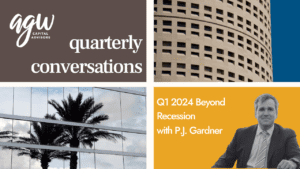Quarterly Conversations – What’s Next
In this video, AGW Principal & Co-Founder P.J. Gardner, CFA®, CFP®, advises on volatility, reserves, diversification, and inflation, emphasizing strategic investing amidst economic uncertainties and market fluctuations. This conversation was recorded on February 1, 2024, and reflects information available at that time.
Audio Only
Highlights
- Volatility and Reserve Strategy: AGW acknowledges market volatility, advocating for holding strategic reserves and diversification to guard against uncertain economic conditions. The firm emphasizes the benefits of inflation-sensitive assets and a cautious approach to bond investments amid fluctuating interest rates.
- International Markets and Valuation: The conversation includes a perspective on international markets, suggesting that they may offer better value compared to the overvalued U.S. market. AGW stresses the importance of reassessing portfolios to ensure a balanced approach to risk and return, considering the potential for shifts in market leadership.
Full Transcript
Okay, so what do you do? Given everything we’ve talked about? I think one thing is acknowledged that volatility is here with us, and I think will continue to be. 2022, the bond market was down 13%. Broadly, the US stock markets down 19%, we saw an incredible rebound again, just in the last sort of, largely in the last two months of the year. I would expect it to continue to move around as people speculate on whether or not we’re going to go into a recession, what’s going to happen in the Middle East, what’s going to happen in the election, and so forth.
So the way you defend against that is, you want to keep a healthy amount of what we’ll call reserves. So think about that as cash equivalents, like money market, think about that, as ultra short term investment grade bonds, whether municipal tax free or corporate and agency bonds. You want to know that distributions that may be coming out of my portfolio have already been set aside and earmarked for that purpose.
The other thing is don’t give up on diversification. I mean, yes, it’s been an incredible period, for tech stocks, and for US stocks. But as I said, diversification is the only free lunch. And so I think that matters more than ever.
And then again, on reserves, it used to be if you set aside reserves, you get no return. But now, again, Fed funds is five and a half percent. So you can get five to 6%. Just to be prudent, you can get paid to be prudent. And that’s the first time we’ve had that, in 15 years.
We talked about interest rates. Finally, normalize it again, look back through 150 years of data, you’re usually around three to 6%. But I would expect a lot of volatility, and where that yield is right, so we were just about 5% in yields in October, and then it fallen below 4%, we could very easily move back directionally towards five or even beyond that.
So I would be prepared for that meaning bonds, from a price standpoint, carry with them a lot more risk than perhaps, as was typical. Certainly, as we talked about, there’s certain more risky sectors of the bond market that are yielding, high single digit, even double digit yields.
All I would say there is there are some very talented seasoned managers with a track record of success, moving portfolios, in and out, and across those various sectors, I would not statically own any of those opportunities can open and close.
And, you know, I’ll say the fundamentals of that underlying bond issue can change dramatically in a relatively short period of time. So be careful in this in those sectors.
The other thing is, I think there’s sort of this belief that we seen inflation, and now it’s magically gone, or soon to be on. And that’s not consistent with history. Inflation usually unfolds in waves.
And that’s largely due to psychology. Right? So we’ve all just experienced inflation, the next time as prices start to rise, people are going to go out and try to buy things in advance worried that it’s going to rise further.
I mean, if you were the purchasing manager for a manufacturing company, and you weren’t either able to buy the inputs that you needed to manufacture your good, or they started to escalate in price, you don’t want to turn to your your CEO and say, shoot, I missed it again.
So I think what you’re going to see and what you saw in the 70s was inflation comeback. And in part they did that Arthur Burns was the Fed chair, the Jay Powell at that time, trying to carefully manage that fed funds rate and monetary policy to sort of guide that perfect landing really hard to do.
And what you know you have to do is painful. So what worked ultimately, is Paul Volcker comes in as Fed chair, takes Fed Funds rates up to 20% pushes the economy into a brutal recession, unemployment spikes, and it changes the mindset of the employee. Right now they have certainty about leverage over the employer. There are still jobs not as many that they can leave for and make a material premium above what they’re making today. You have to shift that mindset to I’m thankful to have a job. And then the associated increases with that also also changed.
So don’t be surprised if inflation kind of either hangs around higher than the Fed’s 2% target level, or even comes back in yet another wave. And so we think owning inflation and sensitive assets, whether those are energy material and mining companies were treasury inflation protected securities that have a ratchet that moves with CPI, I think you just got to be prepared for another year, like 2022.
When, you know, stocks and bonds both may be incredibly volatile or even down. And yet other things like inflation sensitive assets do work. We’ve talked about just how strong the US markets are. And I think myself and in all of us, right, as Americans, we’re very proud of the fact that we have some incredible dynamics at work at work for us.
I mean, we’re we still remain an incredibly entrepreneurial country, our laws, our markets are unrivaled when it when it’s compared to others. So but we do have a history of being overly excited about those things and pricing things at incredible premiums. So I would be looking for a margin of safety.
And again, we’ve talked a little bit about international who knows how that’ll play out again, I think probabilistically it’s more likely international outperform us. But no one would question, international trading, caught closer to 12 times earnings, versus the US market traded closer to 20 offers a greater margin of safety.
And even in 2022, when Russia invaded Ukraine, who would have thought that the international markets would have outperformed the US markets why things in us were a lot better. But no one anticipated that risk. Us was priced for perfection. international markets were unloved and cheaper.
So I think pay attention to price and value. The other thing is, take a look at your portfolio. Even if you have target allocations, commonly, a portfolio might be 60% in stocks and 40%. In bonds, you’re overweight stocks properly, because what happened last year, take the opportunity to trim and sell into strength and then bolster that 40% in bonds giving you more balanced and nothing that’s that’s not casual.
Again, it’s really helped us performance, but stocks and bonds is the strength of the dollar. But as you will recall, the dollars been some would say weaponized in sort of how we addressed and how we tried to penalize Russia in the aftermath of its invasion of Ukraine.
Well, if you’re a central bank around the world, all of a sudden you’re looking at US debt a little differently. And when you look at buying activity with central banks, they’re not buying nearly what they what they were. And yet, issuance, we know, again, we’re running huge deficits, and the CBO and others project that only to continue in supply-demand, we’ve got an incredible supply of bonds coming on the market.
And some of the biggest buyers that we’ve had in recent years, all of a sudden are starting to fade and lose a bit of interest. So who’s going to step in for that? So watch bond auctions. And that sounds really exciting. But it is. And I’d say so far they’re going okay, but they’re not going great.
And so that’s something of concern to us is, if you have a challenge, troubled bond auction, I think that will really spook bond investors. And then lastly, I would say again, it’s just going back to the beginning, the market feels complacent. And we’re coming off of an incredibly euphoric time for stocks that will give way to concern and doubt that’s what a real a real bear market looks like.
People just give up on it. And it’s, it’s, you’ll start hearing things like, just stop the bleeding. I can’t take any more in you’ll actually get to the point where people won’t give it away. And so that’s on the horizon that will come it’s just a question of when.
And so I think there again, you know, we in our portfolios, and, and a number of people have, you know, passive exposure. So, exposure to indexes just recognize, again, those are expensive, largely, and they’re concentrated. And so indexingworks great until you have a change in leadership within the market. And we’ve seen this time and again, financials during the global financial crisis, the lead up in those stocks was incredible.
Speculative tack around.com During 2000 was incredible. Japanese stocks in the 1980s again from global GDP. standpoint, I mean, a global market cap standpoint, made it a huge part of the global marketplace, oil stocks in the 70s. The nifty 50 We talked about in the 60s. I mean, just over and over again.
Investors get overly excited about this. It’s not that they’re wrong. De Vidya Tesla, these companies could all go to go on to generate tremendous profits. And in fact, if you go back to the.com era, Cisco Systems at one point, was the largest single company in the world.
Look at look at what happened. They’ve executed they on what they thought they could do. profits are up dramatically revenues up dramatically. Yet the stock still trades below where it did in March of 2000. So again, price is what you pay value is what you get, and I think you got to be very careful with that.
So best of luck to you and look forward to talk to you next quarter.
AGW Capital Advisors is a registered investment adviser. Information presented is for educational purposes only. It should not be considered specific investment advice, does not take into consideration your specific situation, and does not intend to make an offer or solicitation for the sale or purchase of any securities or investment strategies. Investments involve risk and are not guaranteed. Be sure to consult with a member of the AGW team, another qualified financial adviser, and/or tax professional before implementing any strategy discussed herein.





